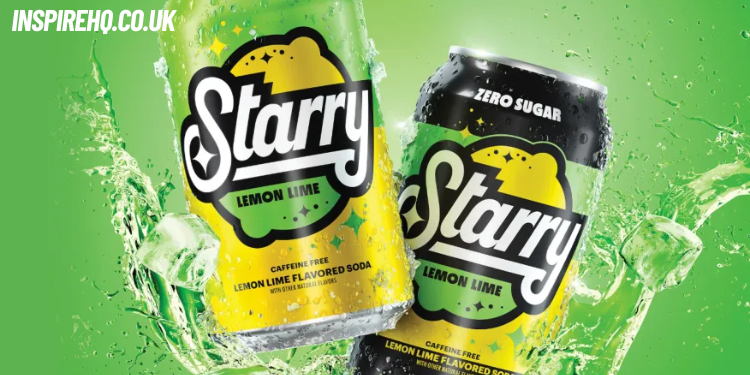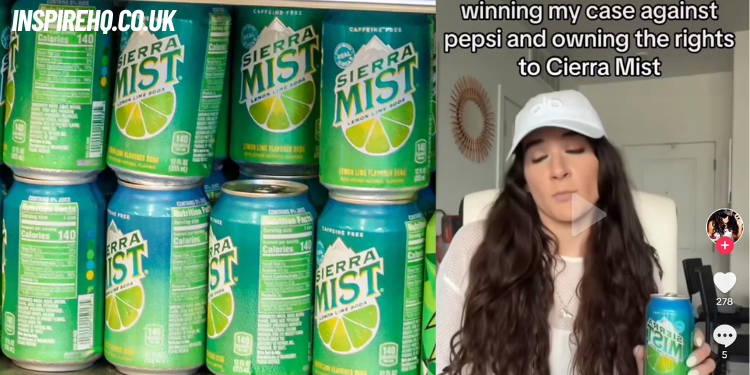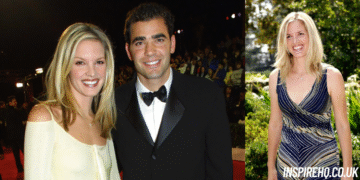The controversy surrounding the Sierra Mist lawsuit has sparked interest across social media platforms, drawing attention to a peculiar legal battle between PepsiCo and influencer Cierra Mistt. While the story has taken the internet by storm, many aspects of the lawsuit remain unclear, leading to a mix of fact and fiction in the public narrative. This article aims to untangle the mystery surrounding the Sierra Mist lawsuit and trademark dispute, offering a comprehensive look at the issue and addressing some of the myths and facts that have emerged.
Background of Sierra Mist
Sierra Mist, introduced by PepsiCo in 1999, was PepsiCo’s answer to competing lemon-lime sodas like Sprite and 7UP. Over the years, Sierra Mist developed a loyal following but never quite achieved the same level of dominance as its competitors. As PepsiCo’s beverage portfolio expanded, the company continuously tried to improve the recipe, and in 2009, Sierra Mist was rebranded as “Sierra Mist Natural” to highlight its use of natural sugar.
In early 2023, PepsiCo made the bold decision to discontinue Sierra Mist altogether, replacing it with a new lemon-lime soda named “Starry.” The shift was part of PepsiCo’s larger strategy to refresh its product lineup and appeal to a new generation of soda drinkers. While the rebranding decision was mostly business-related, it didn’t go unnoticed. Soon after, rumors and stories began circulating on social media, leading to the infamous Sierra Mist lawsuit drama.
Introduction to Cierra Mistt
Cierra Mistt, an influencer and TikTok star, became the focal point of the lawsuit controversy. Known for her comedic videos and relatable content, Cierra has garnered a significant following on platforms like TikTok and Instagram. She’s also recognized for her quirky persona, which draws fans from diverse audiences.
However, Cierra’s rise to social media fame coincided with the trademark dispute that involved her name—Cierra Mistt, which many assumed to be a clever play on the Sierra Mist soda brand. The apparent connection between her name and the popular beverage led to a series of events that would ultimately result in accusations of trademark infringement.
The Alleged Lawsuit
In early 2023, Cierra Mistt made waves by claiming that PepsiCo had sent her a cease-and-desist letter. According to her, the company accused her of infringing on their trademark by using the name “Mist” in her social media persona. The influencer posted about the situation on her social media accounts, expressing frustration over what she believed was an unjust move by PepsiCo.
Her claims quickly gained traction, as followers on platforms like TikTok rallied behind her, showing support for her fight against what they perceived as a corporate giant taking advantage of an individual influencer. The public narrative was that PepsiCo’s actions were an overreach, especially since the name “Sierra Mist” had already been discontinued.
The Reality of Sierra Mist’s Trademark Status
As the story gained momentum, the facts began to come into question. Trademark experts and legal professionals weighed in, pointing out that PepsiCo still held active trademarks for the name “Sierra Mist.” Contrary to Cierra Mistt’s claims, trademarks don’t automatically expire when a product is discontinued. PepsiCo, like most companies, retains ownership of its trademarks as long as they are properly maintained, even if the product is no longer on the market.
In fact, experts clarified that trademarks for specific product names can exist indefinitely, provided the company continues to renew them and demonstrate that the brand is still in use, even if only in an intellectual property sense. Given that PepsiCo continues to operate in the beverage market, the Sierra Mist trademark remained valid despite the product’s discontinuation.
Furthermore, there was no verifiable public record indicating that PepsiCo had ever taken legal action against Cierra Mistt. While it’s true that she had posted about receiving a cease-and-desist letter, no formal lawsuit had been filed, nor was there any public record supporting the existence of such a legal battle.
Trademark Law and Influencer Impact
The situation highlights an important aspect of trademark law that is becoming increasingly relevant in the digital age: the intersection of personal branding and corporate trademarks. In an era where influencers and content creators use names that often overlap with established brands, trademark disputes are becoming more common.
A cease-and-desist letter is typically the first step in resolving trademark infringement claims. Such letters are issued to inform the recipient that their use of a name, logo, or symbol is violating an existing trademark. The letter is not necessarily a lawsuit, but it is a legal warning to stop using the trademarked material.
In Cierra Mistt’s case, the issue was more about name confusion. With her growing social media following, there was the potential for people to associate her name with PepsiCo’s former beverage, Sierra Mist. However, as experts pointed out, it was unlikely that her persona would cause any significant brand confusion, especially since the soda had been discontinued.
Fact-Checking the Lawsuit Claims
When examining Cierra Mistt’s claims, it’s clear that some of her statements might have been exaggerated for dramatic effect or to enhance the story’s appeal. The absence of a formal lawsuit, coupled with PepsiCo’s continued trademark ownership, casts doubt on her narrative. Although she did receive some attention and sympathy online, there were no legal proceedings or documented actions to substantiate her story.
It’s important to recognize how social media can amplify stories that may not have a solid legal or factual basis. Cierra’s story, while compelling, seems to have been built more on a misunderstanding or misrepresentation of trademark law rather than a genuine legal dispute. Trademark infringement claims, especially those involving influential public figures, often draw significant attention, but they require careful scrutiny.
Impact on PepsiCo and Branding
The Sierra Mist lawsuit drama, whether real or exaggerated, had a notable impact on the public perception of PepsiCo. The company, which has long been a major player in the soft drink industry, faced negative attention due to the controversy surrounding one of its well-known products. The rebranding of Sierra Mist to Starry was already a sensitive issue for many consumers, as they were attached to the legacy of the original brand.
Despite this, PepsiCo’s branding strategy appears to have been unaffected by the alleged lawsuit. The company successfully launched Starry, positioning it as a fresh and innovative option for younger consumers. The decision to discontinue Sierra Mist was likely a strategic one, aimed at appealing to a changing market. While the Sierra Mist lawsuit stirred some controversy, it ultimately did not appear to derail PepsiCo’s efforts to move forward with their new product.

What the Sierra Mist Lawsuit Means for Future Brand Disputes
While the Sierra Mist trademark dispute appears to be a non-issue in legal terms, it serves as a reminder of the complexities of trademark law in the digital era. With influencers and personal brands becoming more prominent, companies must tread carefully when it comes to protecting their intellectual property. Influencers, on the other hand, must also be aware of how their names and brands might intersect with established trademarks.
The Sierra Mist saga underscores the growing intersection between personal branding and corporate trademarks. As more people build their personal brands, it’s essential for both influencers and businesses to understand how trademark law works to avoid unnecessary legal disputes.
Conclusion
The “Sierra Mist lawsuit” drama, while captivating, was ultimately a misunderstanding rooted in the intersection of trademark law and social media. Although Cierra Mistt’s claims were widely circulated and supported by her followers, the reality is that PepsiCo still holds the rights to the Sierra Mist trademark, and there is no evidence of a formal lawsuit.
For consumers, the shift from Sierra Mist to Starry is more about PepsiCo’s attempt to modernize its product lineup, rather than any legal battle over branding. The story of Cierra Mistt and her alleged trademark conflict with PepsiCo serves as a valuable lesson in understanding the intricacies of trademark law and the potential for misinformation to spread in the digital age.
As influencers continue to rise in prominence, trademark issues will likely become a more common part of the legal landscape. This case serves as a reminder of how important it is to properly handle intellectual property, whether you’re a corporation or an influencer.
FAQs:
1. What was the Sierra Mist lawsuit about?
The Sierra Mist lawsuit controversy revolves around claims made by influencer Cierra Mistt. She alleged that PepsiCo sent her a cease-and-desist letter accusing her of trademark infringement, claiming her name was too similar to the Sierra Mist brand. However, no formal lawsuit was filed, and the trademark claims were largely disputed.
2. Did PepsiCo really sue Cierra Mistt?
There is no public record or evidence of PepsiCo suing Cierra Mistt. While she posted about receiving a cease-and-desist letter, no official legal action or lawsuit occurred between her and the company.
3. Is Sierra Mist still a registered trademark?
Yes, PepsiCo still holds the active trademark for Sierra Mist, despite discontinuing the beverage. Trademarks do not expire automatically when a product is discontinued, and PepsiCo continues to maintain its trademark rights.
4. Why did PepsiCo discontinue Sierra Mist?
PepsiCo discontinued Sierra Mist in favor of Starry, a rebranded lemon-lime soda. The move was part of a strategic decision to appeal to a younger audience and refresh the brand lineup, not due to any trademark disputes.
5. What can influencers learn from the Sierra Mist lawsuit controversy?
Influencers should be mindful of potential trademark conflicts when using names that may resemble existing brands. Understanding trademark laws and how they apply to personal brands is essential to avoid misunderstandings or legal issues.
Also Read: Choosing the Best RV Electric Water Heater for Your Next Adventure










